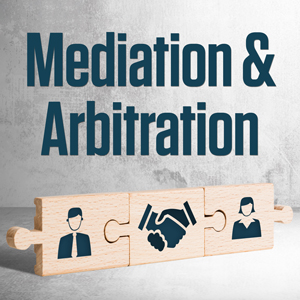
Blog
Process for Mediation Preparation: Atlanta Mediator Edition

Our neutrals work diligently to resolve your issues efficiently and amicably. In individual interviews with each neutral, they were asked a series of questions regarding their preparation and anticipation for dispute resolution. As such, Barry Selvidge shares his strategies for preparing himself and his parties for the mediation process.
Q: How do you prepare for a mediation?
A: “The preparation process is essential to ensure the parties enjoy the greatest possible opportunity to resolve their differences. It’s important for me to gain a full understanding of the disputed issues and the likely areas of conflict between the parties. I’ll also familiarize myself with the relevant legal and factual issues and review any documentation or evidence provided.
I may also conduct short interviews prior to mediation to better understand both parties’ perspectives and goals. These discussions help to establish rapport and trust with each party early on and allow me to gather information relevant to the mediation. This allows me to think ahead to anticipate challenges or obstacles that may arise during the mediation process and develop strategies for effectively addressing them.
A key to my preparation is to determine what the realistic expectations should be for the mediation process and communicate them to the parties in advance. This also informs my selection of techniques and approaches most suitable for the specific circumstances of the process, including the level of conflict or emotion that may be involved.
Each case is unique and may require adjustments to my strategy or techniques. Preparing well allows me to be flexible and better attuned to the parties’ needs.”
Q: What would you say are the most important skills or attributes for a mediator?
A: “Obviously, I must remain neutral and impartial to build trust and credibility with all parties to foster open communication and negotiation. Beyond that, a combination of skills and qualities enables me to facilitate constructive communication, manage conflict, and guide the parties toward a mutually acceptable resolution as the mediator.
I’ve found that actively listening to what the parties are really saying, versus what they are actually saying, helps me get to the crux of the dispute. Hearing each party’s perspective and concerns, and demonstrating that I understand them by showing empathy for their positions, helps to support more productive dialogue that can lead to resolving their disagreements.
I have to be able to quickly grasp complex issues in order to develop creative solutions to help bring the parties together. Exhibiting emotional intelligence also helps me understand the real underlying needs of each party, defuse tension and have more constructive interactions.
Remaining flexible and patient throughout the process demonstrates my commitment to helping the parties work through their differences to find a resolution. Managing conflict throughout and exhibiting my fairness to both parties is also essential to achieve the necessary trust to guide the parties toward a mutually acceptable agreement.”
Q: How would you inform clients about your role in the mediation process?
A: “Setting expectations and ensuring both parties understand both my responsibilities and limitations as a mediator is key to achieving a successful outcome.
At the outset, I’ll explain to the parties what mediation is and how the mediation process differs from other dispute resolution processes such as litigation or arbitration. It’s also important to clarify my role as an impartial facilitator who doesn’t take sides or advocate for either party’s interests, as well as my primary objective to help the parties explore options and reach a mutually acceptable resolution within a confidential setting.
In the end, I ensure both parties understand that I guide and facilitate discussions, but have no authority to impose decisions or make judgments – that’s up to the parties themselves. My role is simply to help create a positive and productive environment for mediation and increase the likelihood of reaching a successful resolution.”
Q: At what point would you intervene in clients’ decision-making processes?
A: “It’s always a delicate balance as a mediator to know when to intervene in a client’s decision-making process. If the parties are just not listening to each other, having ongoing disagreements on fundamental issues, escalating in their emotions, or not willing to consider alternative solutions, they may be at an impasse.
At that stage, I’d try to clarify misunderstandings, reframe issues and facilitate constructive dialogue to restore communication. If there’s a significant power imbalance between the parties that’s hindering the decision-making process due to differences in negotiation skills, knowledge, or resources, I’ll make sure that all parties have an equal opportunity to participate and express their views without feeling disadvantaged.

Sometimes, one or both parties may have unrealistic expectations about the outcome of the mediation or are unwilling to consider reasonable compromises. At this stage, I’ll try and help manage those expectations by providing perspective, exploring alternatives, and emphasizing the benefits of reaching a mutually acceptable resolution.
Other times, one party may be dominating the decision-making process or exhibiting overbearing behavior that prevents the other party from fully participating in the mediation. I’ll do my best to make sure that all parties have an equal opportunity to express their interests and concerns and work toward a mutually acceptable resolution.”
Q: How would you handle a situation where one party is not willing to compromise?
A: “These situations require patience and a strategic approach for intervention. I’d begin by acknowledging the concerns and position of the party who are unwilling to compromise and validate their reasons for being reluctant. Then, I’d attempt to reframe the issue and help them see the situation from a different perspective, while emphasizing the benefits of finding a mutually agreeable solution. Often, I’ll break down the issues into smaller, manageable components and encourage them to take baby steps forward by focusing on areas where compromise seems more attainable and build momentum from there.
I’ve found that promoting respectful dialogue focused on the uncompromising party’s interests rather than their positions can help them communicate their concerns and priorities more effectively. But it’s important to guide both parties through a collaborative process of generating options that accommodate both of their interests.
When all else fails, I’ll try and help the uncompromising party understand the potential risks and costs if they maintain their position such as greater financial expense, permanent damage to relationships and unfavorable outcomes in court. If we reach an impasse, I’ll acknowledge the deadlock openly and consider adjourning the session, seeking additional information or expert opinions, or exploring other dispute resolution methods.”
Q: What is your approach to maintaining neutrality in emotionally charged situations?
A: “It’s essential to stay calm and not react, regardless of the emotional intensity of the situation. Providing stability and reassurance helps to defuse tension and create a safe environment for communication.
I try to listen attentively without judgment and demonstrate empathy and understanding for each party’s experience – including helping the parties understand that emotions are valid, but may need to be managed constructively to reach a resolution. Shifting the focus of the discussion from emotional reactions to underlying interests and needs often helps the parties articulate their interests and concerns more calmly and rationally.
Ultimately, it’s important to maintain my professional distance from the parties throughout any emotional outbursts or conflicts and remain calm and objective, redirecting the discussion back to productive dialogue and problem-solving.”
Q: How do you ensure confidentiality throughout the mediation process?
A: “I establish ground rules from the beginning of the mediation process to ensure both parties that all discussions, documents, and information shared during mediation sessions are confidential and may not be disclosed outside of the mediation process without consent. Reminding the parties of the confidentiality pledge at the beginning of a mediation session and encouraging them to respect each other’s privacy reinforces its importance and helps to ensure compliance throughout the process.
I require that the parties sign a mediation agreement at the outset of the process that outlines the confidentiality provisions and expectations for all participants. I’ll also educate the parties about the scope and limitations of confidentiality within mediation, while ensuring them that mediation sessions are conducted in a private and confidential setting.
Finally, I’ll emphasize that confidentiality obligations continue even after the conclusion of the mediation process and remind them that they are not to disclose confidential information obtained during mediation without consent – and importantly, this includes subsequent legal proceedings. Parties sometimes try to use mediation as a “fishing expedition” for obtaining the other party’s positions and evidence to provide a road map for trial if the dispute is not settled.”
Q: How do you manage power imbalances between parties during mediation?
A: “You first have to recognize the existence of power imbalances and acknowledge how they can affect the dynamics of the mediation process.
It’s important to foster a safe and supportive environment where all parties feel comfortable expressing their views and concerns without fear of retaliation or intimidation. As a result, I take proactive steps to try and level the playing field and mitigate power differentials between the parties. I encourage both parties to have equal speaking time and attempt to prevent one party from dominating the discussion and try to ensure that each party feels free to participate fully and express their interests, needs, and preferences.
I also attempt to address power dynamics directly and openly in the mediation process by encouraging the parties to discuss any concerns or perceptions of unfairness related to power imbalances. I’ll consider using ‘caucus sessions’ to provide private opportunities for parties to express their concerns, explore options, and develop strategies without the presence of the other party. Frequently, caucus sessions can help balance power dynamics and lead to more candid and productive communication between the parties.”
Q: How would you assist clients who were discontented with events following mediation?
A: “I’ll show empathy and support for any party who is not happy with the mediation process and allow them to express their feelings and perspectives without judgment. I also attempt to clarify what their expectations and goals were for mediation and the outcomes they had hoped to achieve. Helping them logically identify any discrepancies between those expectations and the actual result of the mediation usually lessens their discontent.
I also emphasize my lack of authority as the mediator to impose decisions or dictate outcomes. I’ll help them understand that, while mediation can be a valuable tool for resolving disputes, it doesn’t always result in a perfect or ideal solution for all parties involved.”
Barry is well-versed in many fields of disputes and will work tirelessly to amicably reach a consensus. Contact us today if Barry suits your needs. He primarily practices in our Atlanta Mediation Office, but he is willing to travel to you or conduct on-line mediation.





